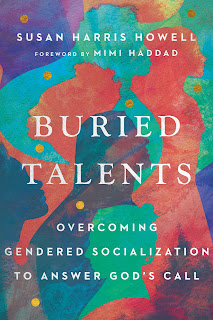Buried Talents: Overcoming Gendered Socialization to Answer God's Call
Review of Buried Talents: Overcoming Gendered Socialization to Answer God’s Call by Susan Harris Howell (Downers Grove, IL: Intervarsity Press, 2022)
“Why do you act like such an airhead when you have such a brilliant mind?” This was a question put to me by a friend and fellow student from an International Law class at the university I attended in the 1970s. I remember his words so distinctly because, via his simple yet piercing quizzing, I was sobered, shaken, and launched into a period of self-examination.
Why? Why was I so focused on the inconsequential? Why was I so completely centered on being attractive, on being entertaining, on being the life of the party? Why did I hide and shove aside my God-given intellect? Why did I underuse my God-given abilities?
In her book, Buried Talents, Susan Harris Howell (EdD, University of Louisville), provided answers to my questions as she revealed the subtle forms of socialization that had shaped and pushed and pulled me into gendered roles and identities. As promised by one reviewer, the book provided a means of “tracing the roots” of my own conditioning.
Howell, a professor of psychology at Campbellsville University, teaches on gender studies and integrating faith and psychology. She frequently writes and speaks for Christians for Biblical Equality. Her book is directed especially to women in the United States who may be wrestling with calls to ministry, but the volume may provide illumination for all who wish to understand how women and men are fitted into gendered roles by the culture within which they reside.
Howell begins by exploring how—from our childhood through adulthood—parents, teachers, churches, the English language, and media socialize us in gender-specific ways. The toys selected for us, the chores to which we’re assigned, the classes toward which we’re directed, the roles denied to us or opened for us, the androcentricity of the language we speak, the portrayal of one movie character as helpless and another as brave and heroic, Howell says, channels children toward some pursuits and away from others.
My own experience elucidates these points. I received mixed signals from my parents in childhood as my mother provided me with dolls and pushed me to focus on my physical appearance while my father rewarded “good visits” to the dentist with models of planes and ships for me to build. I was called a “tomboy” because I played baseball, built forts, dug tunnels, climbed trees, and did my best to outdo the neighborhood boys. But, by the time I reached my adolescence, something shifted, as it did for many girls of my generation. As Howell notes, teen magazines focused on clearing up one’s skin, wearing the latest fashions, and charming the opposite sex. The movies portrayed females as damsels in distress who needed a rescue; males did the rescuing. I saw my social self-image improve when I curtailed my athletic and academic achievements. These messages of conformity to expectations came into me as if by osmosis; I responded by leaving gymnastics to become a cheerleader. And my classes?
I vividly recall a math teacher telling me again and again he wished he knew how to “light a fire under me.” A chemistry teacher lamented at end of term that she thought I would have been her best student. I wasn’t; I was too busy with “more important matters.”
Nearly twenty years of conditioning, Howell suggests, takes us into adulthood with gendered expectations in leadership roles. Men lead. Women support. Women sacrifice so men can succeed.
I should note, at this juncture, that this review is turning out to be the most personal I’ve ever written, and that fact speaks to the power of Howell’s book to elicit memories, to aid us in understanding our histories, to enable us to commiserate with ourselves, and to examine critically the who, what, where, when, why, and how of our todays. Readers may find Howell’s words of help in putting a stop to the blaming of those who nurtured us, as best they could, given their own conditioning. Howell’s words may also inspire us to “pay it forward” by helping others along the path of self-discovery.
Howell’s focus, on how some women may hold back on responding to God’s call to leadership in the church, reminded me of my own experience. I didn’t come to faith in Christ until I was nearing my 30th birthday, and I didn’t “come into my own” until I was in my thirties and sensing a call to the Lord’s service. When I entered seminary, I had no clue as to what sort of work God would call me; I believed—at the time—that I was a tabula rasa, but I realize now, I was reshaped in seminary. The training, for the Master of Divinity degree at Gordon Conwell Theological Seminary, prepared me for the roles I would fill as pastor, professor, doctoral program director, community leader, renewal agent, reformer, author, and conference speaker.
In Buried Talents, Howell visits the complementarian and egalitarian positions on marriage, career, and women in ministry and closes the book with three chapters of advice on how to make changes within ourselves and within our spheres of influence. In summary, her suggestions include building more accurate self-perceptions so an individual may feel released to answer God’s call; harnessing thoughts to change behavior; engaging in more positive self-talk; restructuring one’s mindset; building a support system; and connecting with likeminded others. Finally, she calls her readers to “pay it forward” in effecting change at the micro and macro levels. A discussion guide and resource list for women’s networking are included.
I closed the book wondering how it might be read by the youngest of our generations in the United States who, in many ways, are riding a pendulum swing, a sorting out of a new paradigm.
Howell admits in the initial pages of the book that she can’t cover every aspect of a topic as broad as gender, noting especially her decision not to focus on the field that is intersectionality—the study of how gender, race, and class intersect to create distinctive forms of discrimination.
In conclusion, I agree with Mimi Haddad, who provided the Foreword, that Buried Talents: Overcoming Gendered Socializations to Answer God’s Call does unmask “gendered spheres that sideline women’s gifts and callings.” The work is, as Haddad asserts, “a compelling call to advance human flourishing.” I recommend the book and believeBuried Talents would serve as a useful text in pastoral leadership and psychology courses.
Donna F.G. Hailson is an award-winning writer, editor, educator, administrator, and photographer focusing on theology, nature, and the arts as spiritual ambassadors for the Christian faith. She has served as a professor of Christian spiritual disciplines, evangelism, culture tracking, world religions, new religious movements, and practical ministry, and directed a Doctor of Ministry program centered on personal, congregational, and community renewal. As an American Baptist Churches USA ordained minister, she has pastored congregations in three states. She has addressed audiences in the United States and Europe and has served on several international commissions and committees. She has extensive training and experience in relief work and disaster response having directed organizations charged with helping society’s at-risk, homeless, and marginalized individuals and families. She is at work on her sixth book, a memoir centered on her husband’s stroke and its aftermath. Her articles, columns, and book reviews are found in professional journals and popular magazines. Her writings include a collaboration with Aida and William Spencer and Catherine Clark Kroeger on The Goddess Revival: A Biblical Response to Goddess Spirituality, named a Christianity Today Book of the Year.


